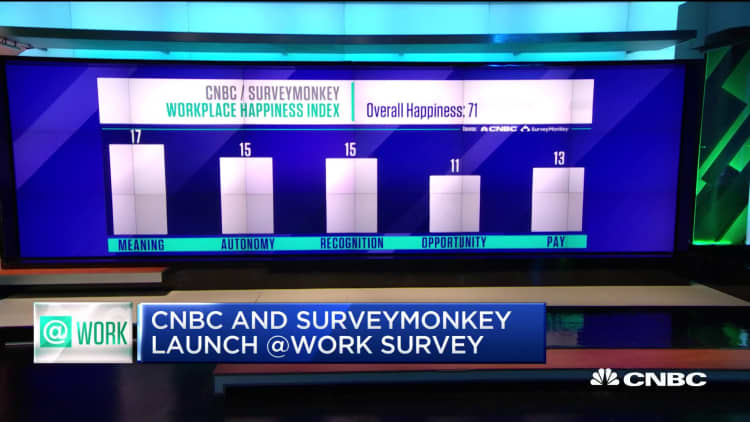What would make workers happier? More money, of course! But perhaps surprisingly, a majority say that a higher salary is not the one change that would most improve their job satisfaction. This was revealed in the first CNBC/Survey Monkey Workplace Happiness Index, announced Tuesday at the @Work Talent + HR Summit in New York City.
The majority claim that other, non-monetary job benefits would be key in boosting their happiness. Fourteen percent said they would like "more training or learning opportunities," while 9 percent said more paid time off would most improve their job satisfaction. Less than half (41 percent) said "higher salary" when polled.

The quarterly index was created as part of CNBC's @Work franchise, which includes a three-part event series spotlighting the future of work. The index measures how Americans feel about their jobs across five key categories – pay, opportunities for advancement, recognition, autonomy and meaning. CNBC and SurveyMonkey poll 8,664 professionals nationwide across a wide swath of industries. Data has been weighted for age, race, sex, education, employment status, and geography using Census Bureau's Current Population Survey to reflect the demographic composition of United States employed population.
The first measure of the CNBC/SurveyMonkey Workplace Happiness Index is an optimistic 71 out of 100.
When it comes to salary, 25 percent of workers say they are in fact "very well paid," and 48 percent say they are "somewhat well paid."
The survey found that, even beyond paying them more, providing workers with opportunities to advance their careers may be the best way to improve employee satisfaction. In fact, dissatisfied workers are more likely to say they lack opportunities to advance than they are to say they are not well paid. "Four in 10 workers give their companies a negative rating on how well they help their employees advance their careers," said Jon Cohen, SurveyMonkey Chief Research Officer. "That's the highest negative rating of the five index composites, and an obvious area for improvement."
It's little surprise then, that across all ages, demographics and worker types, opportunities for training and learning was the second most popular choice for what could most improve job satisfaction (after pay), finishing ahead of seemingly popular benefits like more paid time off, more flexible schedule or increased family benefits.
The CNBC/SurveyMonkey online poll was conducted March 13–18 among a national sample of 8,664 workers in the United States. Respondents for this survey were selected from the more than 2 million people who take surveys on the SurveyMonkey platform each day. Data have been weighted initially for age, race, sex, education and geography using the Census Bureau's American Community Survey to reflect the demographic composition of the United States age 18 and over, then weighted for age, race, sex, education, employment status and geography using Census Bureau's Current Population Survey to reflect the demographic composition of U.S. employed population. The modeled error estimate for this survey is plus or minus 1.5 percentage points. Full results available here.





